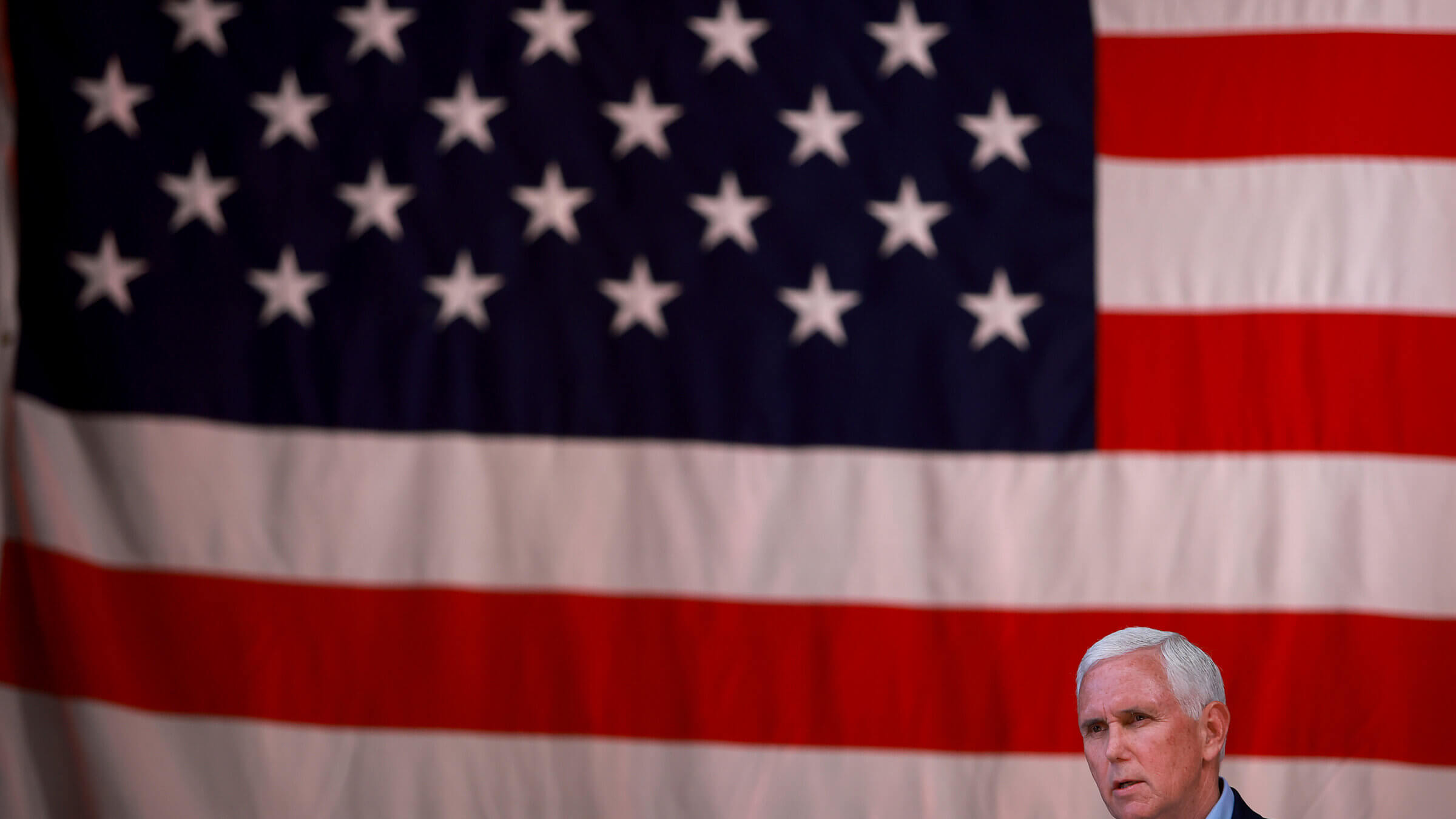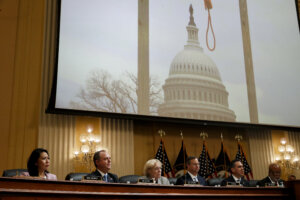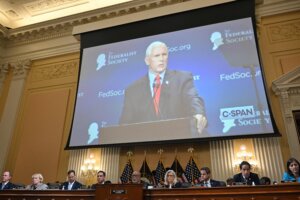Should we really call Mike Pence courageous — and what do we mean by courage anyway?
In light of Jan. 6, we should remember Voltaire’s contention that courage was a quality shared by the base and the great

Former U.S. Vice President Mike Pence speaks at a campaign event for Georgia Gov. Brian Kemp in March, 2022. Photo by Getty Images
Seventy-five years ago, Albert Camus’ novel “La Peste” was published in France. Readers of the English translation, “The Plague,” have thrilled to its tale of a motley crew of characters who, when the bubonic plague bursts into their world, join forces to resist it. The thrill thickens upon the realization that Camus based the novel on a different kind of plague — the occupation of France by the so-called “peste brune,” or brown plague of Nazism, and the men and women who risked their lives to oppose it.
Why did they do so? By way of reply, the narrator warns the reader that he does not want to exaggerate the actions of such volunteers by citing their “courage” or “heroism.” Doing what they had to do, they are to be congratulated no more than “a teacher on teaching that two and two make four.” Of course, there will always be times when affirming that two and two equals four can be dangerous, even deadly. Yet this does not change “knowing whether two and two do make four.”
One of the novel’s characters, Joseph Grand, does the math more quickly than his fellow resisters. Invited to join the sanitation team battling the plague — an invitation that means almost certain death — Grand agrees “without a moment’s hesitation.” The absence of hesitation is crucial. Though Grand lacks the words to express himself — he famously spends his life trying to get past the first line of a novel he wishes to write — the clarity of his vision leads to the alacrity of his action. It is as if the two actions, seeing and acting, occur simultaneously. Acting does not so much follow seeing as it instead accompanies it.

The story Camus tells about courage and heroism throws a sobering light on the story the select congressional committee is now telling about the Jan. 6 insurrection.
In the committee’s third session, held last Thursday, the narrative focused on the actions of then-vice president Mike Pence. With photos never before seen and testimony never before heard, we learned that then-President Donald Trump called Pence on the morning of Jan. 6. He pressured him to use his ceremonial role in counting the electoral votes to, in effect, overturn the presidential election results of November 2020.
When Pence refused to agree, Trump lashed out, calling him a wimp. Hours later, in the speech he gave to thousands of angry supporters gathered near the White House, Trump declared his hope that “Mike has the courage to do what he has to do.” Shortly after, many of those same supporters had, at Trump’s urging, marched on the Capitol Building, where the vote count was taking place.
Though Trump did not, as he vowed in his speech, accompany the protestors, he was with them in spirit. At precisely 2:24 p.m., he tweeted that Pence “didn’t have the courage to do what was necessary.” As videos reveal, the tweet, read aloud by protestors who were already surging toward the Capitol, further inflamed them.
While hundreds breached the police barriers and surged into the building, others chanted “Hang Mike Pence” and displayed a noose. Pence, along with his family and staff, was bundled off by Secret Service agents to an underground loading dock. Refusing to leave with his motorcade, he waited several hours, surrounded by bodyguards and staff members. When the rioters were finally dispersed, Pence picked up where he had left off and, by what was then the next day, completed the electoral tally and declared the victory of Joseph Biden.

The rest is history. But what are we to do with this history? Now that the committee is fleshing out the narrative of events of Jan. 6, what are the meanings, and perhaps even the morals, we can draw from it?
For many observers, one meaning is that our republic was saved by a single man’s courage and heroism. In The Atlantic magazine, the conservative journalist Jonathan V. Last urged Congress to name a building in Pence’s honor and for Pence to receive the Presidential Medal of Freedom. “While he was not the hero you or I might have wanted,” Last told his liberal readers, Pence “was the hero America needed.”
Pence was not just any hero, but a Harrison Ford-like hero, according to CNN’s legal and political affairs commentator Jeffrey Toobin. After the Thursday hearing, Toobin praised Pence for his “act of real courage,” blurting that the committee’s account of his refusal to leave with the motorcade “was more like a Harrison Ford movie than a congressional hearing.”
Not surprisingly, the members of the Jan. 6 select committee echoed this interpretation. The chairman, Representative Bennie Thompson, praised Pence for his refusal to swallow the bizarre scheme cooked up by John Eastman and embraced by Donald Trump to undermine the electoral vote count. “We’re fortunate for Mr. Pence’s courage on Jan. 6. Our democracy came dangerously close to catastrophe.”
It is clear our republic was (and remains) in danger, just as it is clear our republic was fortunate that Pence refused to play along with Trump. If he had, the consequences would surely have been catastrophic. Less clear, though, is whether we can call Pence’s act courageous.
While moral philosophers have long differed on the details, most agree that courage occurs when one confronts, contains or conquers fear. Curiously, this means a Stoic, if she truly believes it is unreasonable to fear things outside her control, is not, strictly speaking, courageous. No less curious, this also means that a bad guy, in pursuit of an evil end, can be as courageous as a good guy seeking the very opposite. This explains why Voltaire, who knew a thing or two about courage, insisted it is not even a virtue, but instead “a quality shared by the base and great.”
This helps explain why, in the batting order of Team Virtue, courage holds an unusual place. It bats both leadoff, cleanup and every other slot. In fact, if courage is not in the lineup, no other virtue can make it to home plate, much less first base. This is because, without courage, we can neither enact nor act upon any other virtue. A coward can no more be virtuous than a corpse can swing a bat.
The French Jewish philosopher Vladimir Jankélévitch, who spent the Occupation fighting in the Resistance, captured this elusive quality to courage. It is not just one virtue among others, he wrote in his “Traité des vertus” (A Treatise on the Virtues), but instead it is “the condition that realizes the other virtues. Sincerity, justice, and modesty all begin in this inaugural act.” The duty to be just, the imperative to be honest, the necessity to be loyal all need to be ignited by courage.
This explains, as well, Camus’ reluctance to praise as heroes those who resisted. They did what they had to do, just as we must have to conclude two and two equals four. Upon acknowledging — better yet, seeing — this objective truth, every else follows. Or, more accurately, unfolds at the same time. It is not so much “Seeing is believing” as “Seeing is doing.”
On Jan. 6, Caroline Edwards embodied this ethic. A Capitol police officer, she joined the handful of fellow officers who, behind a bicycle rack, were trying to block a great wave of violent protestors. Pushed over by the mob, Edwards was knocked unconscious. When she recovered, she immediately rejoined her overwhelmed comrades, all of whom were then tear-gassed and pepper-sprayed by the insurrectionists. “Never in my wildest dreams did I think that as a police officer,” she told the committee, “I would find myself in the middle of a battle.”
But in this nightmare that became reality, Officer Edwards did find herself in the middle of a battle and, without reflecting or reasoning, saw and acted at one and the same time. Like Joseph Grand, Edwards could not find the words to express herself. “It was chaos,” she told the committee. “I — I can’t — even describe what I saw.” But both Chairman Thompson and Vice-Chairwoman Liz Cheney could and did describe what they saw in Edwards’ response to the chaos: an instance of heroic courage.
This is what Jankélévitch meant, I think, when he states that courage is a decision, not a conviction; that it is an act, not an assessment of facts. Along with her fellow officers, Edwards acted to defend the republic. In the end, Pence did the same. But how different was his “doing” from the “doing” of Edwards?
Pence had spent the previous days and weeks trying to convince himself to, once again, swallow another Trump outrage. Why else would he ask his legal staff, scholars and even former vice president Dan Quayle, for their assessment of the facts? Their assessment in this case was no more necessary than in, say, the case of Trump’s claim that there were “fine people” on both sides in the neo-Nazi march in Charlottesville. Or Trump’s claim that one needed to “grab women by the pussy.” Or Trump’s claim that the tearing away of children from their parents on our southern border was the fault of the Democrats.
In those earlier instances, Pence did not act, no doubt because he refused to see. As for his act on Jan. 6, it might well have resembled a Hollywood cliché. But it was an act that had nothing in common with the uncommon heroism of a Joseph Grand or a Caroline Edwards.
The Forward is free to read, but it isn’t free to produce

I hope you appreciated this article. Before you go, I’d like to ask you to please support the Forward.
Now more than ever, American Jews need independent news they can trust, with reporting driven by truth, not ideology. We serve you, not any ideological agenda.
At a time when other newsrooms are closing or cutting back, the Forward has removed its paywall and invested additional resources to report on the ground from Israel and around the U.S. on the impact of the war, rising antisemitism and polarized discourse.
This is a great time to support independent Jewish journalism you rely on. Make a gift today!
— Rachel Fishman Feddersen, Publisher and CEO
Support our mission to tell the Jewish story fully and fairly.
Most Popular
- 1

Fast Forward Ye debuts ‘Heil Hitler’ music video that includes a sample of a Hitler speech
- 2

Opinion It looks like Israel totally underestimated Trump
- 3

Culture Cardinals are Catholic, not Jewish — so why do they all wear yarmulkes?
- 4

Fast Forward Student suspended for ‘F— the Jews’ video defends himself on antisemitic podcast
In Case You Missed It
-

Culture Should Diaspora Jews be buried in Israel? A rabbi responds
-

Fast Forward In first Sunday address, Pope Leo XIV calls for ceasefire in Gaza, release of hostages
-

Fast Forward Huckabee denies rift between Netanyahu and Trump as US actions in Middle East appear to leave out Israel
-

Fast Forward Federal security grants to synagogues are resuming after two-month Trump freeze
-
Shop the Forward Store
100% of profits support our journalism
Republish This Story
Please read before republishing
We’re happy to make this story available to republish for free, unless it originated with JTA, Haaretz or another publication (as indicated on the article) and as long as you follow our guidelines.
You must comply with the following:
- Credit the Forward
- Retain our pixel
- Preserve our canonical link in Google search
- Add a noindex tag in Google search
See our full guidelines for more information, and this guide for detail about canonical URLs.
To republish, copy the HTML by clicking on the yellow button to the right; it includes our tracking pixel, all paragraph styles and hyperlinks, the author byline and credit to the Forward. It does not include images; to avoid copyright violations, you must add them manually, following our guidelines. Please email us at [email protected], subject line “republish,” with any questions or to let us know what stories you’re picking up.















